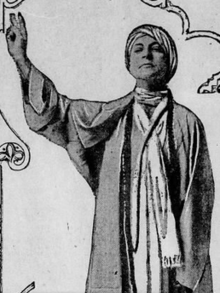Zamin Ki Dost
Zamin Ki Dost | |
|---|---|
 Willimina Leonora Armstrong, from a 1913 newspaper. | |
| Born | Willimina Leonora Armstrong August 14, 1866 Nebraska |
| Died | November 2, 1947 Los Angeles, California |
| Occupation | physician, writer, lecturer |
Notable work | Incense of Sandalwood (1904) Son of Power (1920, with Will Levington Comfort) |
| Relatives | Saleni Armstrong-Hopkins (sister) |
Zamin Ki Dost (transl. Friend of the Earth; pen name of Willimina Leonora Armstrong) (August 14, 1866 – November 2, 1947) was an American physician, writer, and lecturer. She is best known for her book Incense of Sandalwood (1904)[1] and stories of India written in collaboration with Will Levington Comfort and published as Son of Power (1920).[2]
Early life and education[]
Willimina Leonora Armstrong was born in Nebraska in 1866,[3] the daughter of William Leonard Armstrong and Elizabeth Summers Armstrong (1830-1870). Her father was a Union Army surgeon in the American Civil War. She was educated in Philadelphia.[4]
Career[]
In 1887 she went to India as a medical missionary and served with her older sister, physician Saleni Armstrong-Hopkins.[5] In 1901 she settled in Los Angeles teaching philosophy,[6] and writing stories and poems.[4] In 1904 she published the book Incense of Sandalwood where she gathered her experience of living in India.[5] She wrote eighteen stories of India under the pen name Zamin Ki Dost published in collaboration with Will Levington Comfort as Son of Power.[7] She also composed songs.[8] Armstrong was sued in 1913 for compelling a loan from one of her students with hypnotism.[9]
Death[]
Willimina Leonora Armstrong died in 1947, and is buried at Glen Haven Memorial Park, Sylmar, California. Her papers are in the UCLA Library, Department of Special Collections.[10]
Works[]
Books[]
- 1904 – Willimina Leonora Armstrong, Incense of the Sandalwood[1]
- 1920 – Will Levington Comfort, Willimina Leonora Armstrong, Son of Power[11]
- 1931 – Will Levington Comfort, Zamin ki Dost, Caroline Renner, Bestien und Heilige[12]
- 1957 – Essential things to know and do, compiled by Noor Zhan[13]
Songs[]
- 1908 – Zamin Ki Dost, Have no Fear[14]
- 1908 – Zamin Ki Dost, Armageddon[15]
- 1908 – Zamin Ki Dost, Light of my eyes[16]
- 1908 – Zamin Ki Dost, I hear his voice calling me[17]
- 1908 – Zamin Ki Dost, America invincible; Office for our dead[18]
- 1908 – Zamin Ki Dost, Lullabye[19]
- 1908 – Zamin Ki Dost, A hymn to world peace; Office for our dead[20]
- 1908 – Zamin Ki Dost, The great transmuter[21]
- 1908 – Zamin Ki Dost, Uncle Samuel's men[22]
References[]
- ^ Jump up to: a b Armstrong, Willimina Leonora (1904). Incense of Sandalwood. Baumgardt Publishing Company.
- ^ Dost, 1866-1947; Comfort Will Levington Zamin Ki (2006). Son of Power. Project Gutenberg.
- ^ Congress, The Library of. "LC Linked Data Service: Authorities and Vocabularies (Library of Congress)". id.loc.gov. Retrieved 2020-01-11.
- ^ Jump up to: a b "Zamin Ki Dost, 1866-1947 - Social Networks and Archival Context". snaccooperative.org. Retrieved 2020-01-11.
- ^ Jump up to: a b "Finding Aid for the Zamin Ki Dost Papers, 1930-1960". oac.cdlib.org. Retrieved 2020-01-11.
- ^ "Institute Sessions". The Pomona Progress. 1906-12-21. p. 10. Retrieved 2020-09-16 – via Newspapers.com.
- ^ McWilliams, Carey (1973). Southern California: An Island on the Land. Gibbs Smith. p. 255. ISBN 978-0-87905-007-8.
- ^ "Zamin Ki dost - Franklin Search Results". franklin.library.upenn.edu. Retrieved 2020-01-11.
- ^ "Asks Law to Wrest Cash from Grip of Occult". The Los Angeles Times. 1913-09-06. p. 11. Retrieved 2020-09-16 – via Newspapers.com.
- ^ Finding Aid for the Zamin Ki Dost Papers, 1930-1960, UCLA Library, Department of Special Collections.
- ^ Dost, 1866-1947; Comfort Will Levington Zamin Ki (2006). Son of Power. Project Gutenberg.
- ^ Comfort, Will Levington; Dost, Zamin Ki; Renner, Caroline (1931). Bestien und Heilige (in German). Transmare Verlag.
- ^ "Essential things to know and do, New Age Publishing". UCLA Library. 1957.
- ^ Zamin Ki Dost (1918). "Have no fear". franklin.library.upenn.edu. Retrieved 2020-01-11.
- ^ Zamin Ki Dost (1918). "Armageddon". franklin.library.upenn.edu. Retrieved 2020-01-11.
- ^ Zamin Ki Dost (1918). "Light of my eyes". franklin.library.upenn.edu. Retrieved 2020-01-11.
- ^ Zamin Ki Dost (1918). "I hear his voice calling me". franklin.library.upenn.edu. Retrieved 2020-01-11.
- ^ Zamin Ki Dost (1918). "America invincible ; Office for our dead/". franklin.library.upenn.edu. Retrieved 2020-01-11.
- ^ Zamin Ki Dost (1918). "Lullabye /". franklin.library.upenn.edu. Retrieved 2020-01-11.
- ^ Zamin Ki Dost (1918). "A hymn to world peace ; Office for our dead /". franklin.library.upenn.edu. Retrieved 2020-01-11.
- ^ Zamin Ki Dost (1918). "The great transmuter /". franklin.library.upenn.edu. Retrieved 2020-01-11.
- ^ Zamin Ki Dost (1918). "Uncle Samuel's men /". franklin.library.upenn.edu. Retrieved 2020-01-11.
External links[]
- Writers from Nebraska
- 20th-century American women physicians
- 20th-century American physicians
- 20th-century American women writers
- 1866 births
- 1947 deaths
- Burials in California
